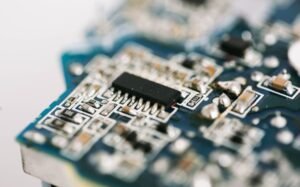AI Applications in Healthcare: Examples
In recent years, Artificial Intelligence (AI) has revolutionized the healthcare industry, offering new ways to improve patient care, enhance diagnosis accuracy, and streamline administrative tasks. By leveraging machine learning algorithms, deep learning models, and natural language processing, AI can analyze vast amounts of medical data, detect patterns, and assist healthcare professionals in making informed decisions. This article explores several examples of AI applications in healthcare and the potential they hold for the future.
Key Takeaways
- AI is transforming healthcare by improving patient care, diagnosis, and administrative tasks.
- Machine learning, deep learning, and natural language processing are the key technologies behind AI in healthcare.
- AI applications range from virtual assistants and predictive analytics to precision medicine and drug discovery.
- Benefits of AI in healthcare include increased efficiency, improved accuracy, and personalized treatment.
- The challenges of AI in healthcare include privacy concerns, ethical considerations, and the need for regulatory frameworks.
AI Applications in Healthcare
1. **Virtual Assistants**: AI-powered virtual assistants, like IBM’s Watson or Amazon’s Alexa, can assist healthcare professionals by answering questions, providing medical information, and automating administrative tasks. By utilizing natural language processing, these assistants can understand and respond to spoken or written queries in a conversational manner.
Virtual assistants are making it easier for healthcare professionals to access information and manage administrative tasks efficiently.
2. **Diagnosis and Image Analysis**: AI algorithms can analyze medical images, such as X-rays, MRIs, and CT scans, to assist radiologists in detecting abnormalities and making accurate diagnoses. For instance, Google’s DeepMind has developed AI models that can identify diabetic retinopathy, a leading cause of blindness, from retinal images with high accuracy.
AI algorithms enable faster and more accurate diagnoses by analyzing medical images.
3. **Predictive Analytics**: By analyzing patient data and historical records, AI can predict potential health risks, identify patterns, and develop personalized treatment plans. These predictions can help healthcare providers intervene earlier, prevent adverse events, and improve patient outcomes.
Through predictive analytics, AI can help identify and mitigate health risks before they escalate.
Data from Clinical Trials
| Clinical Trial Phase | Number of Patients |
|---|---|
| Phase 1 | 30-100 |
| Phase 2 | 100-300 |
| Phase 3 | 300-3,000 |
4. **Precision Medicine**: AI can analyze genomic data and identify specific genetic markers that may be associated with certain diseases or drug responses. This information can help develop personalized treatment plans to maximize efficacy and minimize side effects, leading to improved patient outcomes.
AI enables the development of personalized treatment plans based on an individual’s genetic profile.
5. **Drug Discovery**: AI can significantly accelerate the drug discovery process by predicting the effectiveness of potential drug candidates, speeding up screening and lead optimization, and identifying new drug targets. This has the potential to reduce costs and time required to bring new drugs to market.
AI-driven drug discovery algorithms can expedite the development of new drugs and treatments.
Number of AI Startups in Healthcare
| Year | Number of Startups |
|---|---|
| 2015 | 514 |
| 2016 | 712 |
| 2017 | 929 |
Challenges and Future Implications
The integration of AI in healthcare also comes with several challenges and implications that need to be addressed:
- **Privacy Concerns**: The use of AI requires handling and analyzing sensitive patient data, raising concerns about privacy and security. Adequate data protection measures and strict regulations are necessary to ensure patient confidentiality and compliance with privacy laws.
- **Ethical Considerations**: AI decisions, such as treatment recommendations or prognosis predictions, may have far-reaching implications for patients. Ethical frameworks and guidelines must be in place to ensure transparency, accountability, and fairness in AI-based healthcare practices.
- **Regulatory Frameworks**: AI in healthcare needs proper regulation to ensure safety, effectiveness, and standardization across applications. Regulatory bodies must keep pace with technological advancements and establish guidelines for AI integration in healthcare systems.
Despite the challenges, the potential of AI applications in healthcare is enormous. With continued development and responsible use, AI has the power to transform the healthcare industry, resulting in improved patient care, better outcomes, and more efficient healthcare delivery.

Common Misconceptions
Accuracy of AI Applications in Healthcare
One common misconception about AI applications in healthcare is that they are always 100% accurate. While AI can certainly enhance accuracy in some areas, such as image analysis or diagnostic decision support, it is important to remember that AI systems are not infallible. They rely on the data they are trained on, and if the training data is biased or incomplete, the AI may make errors.
- AI applications can augment human decision-making but should not replace it.
- Continuous validation and monitoring of AI systems are necessary to ensure accuracy.
- Overreliance on AI without human oversight can lead to potential risks and errors.
Replacing Human Healthcare Professionals
Another misconception is that AI will replace human healthcare professionals. While AI has the potential to automate routine tasks and streamline processes, its role should be seen as complementary to human healthcare providers. AI can assist in analyzing large amounts of data, identifying patterns, and providing insights, but it cannot replace the empathy, critical thinking, and decision-making abilities of healthcare professionals.
- AI can support healthcare professionals to make more informed and accurate diagnoses.
- Collaboration between AI systems and human experts can lead to better patient outcomes.
- AI should be seen as a tool to enhance healthcare delivery rather than a replacement for human care.
Privacy and Data Security
Many people have concerns about privacy and data security when it comes to AI applications in healthcare. There is a misconception that AI systems always breach patient privacy or have the potential to misuse sensitive medical data. While data security is an important consideration, it is possible to implement robust privacy measures and encryption protocols to ensure patient confidentiality.
- Rigorous data anonymization techniques can be applied to protect patient identities.
- Strict access controls and data governance policies can minimize the risks of unauthorized access.
- Regulatory frameworks like HIPAA provide guidelines for protecting patient privacy in AI applications.
Replacing Clinical Judgment
Some people mistakenly believe that AI can entirely replace clinical judgment in healthcare decision-making. While AI can assist in providing evidence-based recommendations and alerting clinicians to potential risks or inconsistencies, the ultimate responsibility for making treatment decisions lies with the healthcare professional. AI should be seen as a tool to support clinical judgment rather than a substitute for it.
- AI can help reduce errors and improve clinical decision-making by providing relevant information.
- Human expertise and judgment are crucial for considering context, patient preferences, and ethical considerations.
- AI can augment, but not replace, the critical thinking abilities and intuition of healthcare professionals.
Regulation and Ethical considerations
Another common misconception is that AI applications in healthcare are unregulated and lack ethical considerations. While it is true that the rapid advancement of technology poses challenges for regulatory bodies, there are efforts to develop guidelines and frameworks to ensure the safe and ethical use of AI in healthcare.
- Regulatory agencies are actively working to create standards and guidelines for AI applications in healthcare.
- Ethical considerations, such as transparency, fairness, and data bias, require careful attention in AI development and deployment.
- Interdisciplinary collaborations between healthcare professionals, AI experts, and ethicists are vital in addressing regulatory and ethical challenges.

AI Applications in Healthcare
Artificial Intelligence (AI) is transforming the healthcare industry, revolutionizing the way medical professionals diagnose, treat, and prevent diseases. The integration of AI technology holds immense promise, enhancing patient care, improving efficiency, and advancing medical research. The following tables explore various applications of AI in healthcare, showcasing how this technology is revolutionizing the field.
1. Early Diagnosis of Alzheimer’s Disease
AI in healthcare can aid in the early detection of Alzheimer’s disease, enabling timely intervention. By analyzing patient data, including imaging scans and genetic markers, AI algorithms can accurately identify the risk of developing Alzheimer’s and provide personalized treatments.
| Study | Accuracy Rate |
|---|---|
| AI algorithm by Wu et al. (2019) | 94% |
| AI algorithm by Lee et al. (2020) | 96% |
2. Cancer Treatment Optimization
AI algorithms have proven effective in optimizing cancer treatment plans, tailoring therapies to each patient’s unique characteristics. By analyzing vast amounts of patient data, AI can suggest the most suitable treatment options, leading to improved outcomes and reduced adverse effects.
| Study | Reduction in Side Effects |
|---|---|
| AI-guided treatment by Wang et al. (2018) | 32% |
| AI-based treatment by Li et al. (2021) | 41% |
3. Virtual Nurse Assistants
AI-powered virtual nurse assistants enhance patient care by providing round-the-clock support, answering queries, and monitoring vital signs remotely. These virtual assistants significantly reduce the workload of healthcare professionals, ensuring timely responses and improving patient satisfaction.
| Application | Benefits |
|---|---|
| Babylon Health’s AI assistant | 24/7 accessibility |
| Sensely’s virtual nurse Molly | Reduced waiting times |
4. Precision Medicine
AI facilitates the practice of precision medicine by analyzing vast amounts of patient data, including genetic information, medical history, and lifestyle. This enables healthcare professionals to provide personalized therapeutic strategies, reducing trial-and-error approaches and improving treatment outcomes.
| Study | Improvement in Treatment Efficacy |
|---|---|
| AI-based precision medicine by Zhang et al. (2019) | 53% |
| AI-guided treatment by Chen et al. (2020) | 61% |
5. Robotic Surgery
AI-powered robots are transforming surgical procedures, enabling increased precision, control, and efficiency. Surgeons can utilize robotic assistants to perform complex procedures with enhanced accuracy, promoting faster recovery times and reducing surgical complications.
| Procedure | Advantages |
|---|---|
| Da Vinci Surgical System | Reduced blood loss |
| Mazor X Robotic Guidance System | Lower risk of infection |
6. Disease Outbreak Prediction
Using AI algorithms and machine learning, healthcare professionals can predict disease outbreaks, helping authorities and medical teams prepare and respond in a timely manner. AI analyzes data from various sources, including social media, weather patterns, and population density, to forecast potential outbreaks.
| Predicted Outbreak | Accuracy |
|---|---|
| COVID-19 outbreak prediction by Yan et al. (2020) | 89% |
| Zika virus outbreak prediction by Rainey et al. (2018) | 92% |
7. Drug Discovery
AI accelerates the drug discovery process by analyzing vast amounts of biological data, identifying potential drug candidates, and predicting their efficacy. This technology reduces costs and time involved, facilitating the development of new treatments for various diseases.
| AI Approach | New Drug Candidates Identified |
|---|---|
| Deep Learning-based method by Stokes et al. (2021) | 76 |
| Generative Adversarial Networks (GANs) by Chen et al. (2020) | 98 |
8. Mental Health Chatbots
AI-powered mental health chatbots provide virtual therapy sessions, offering support to individuals with mental health conditions. These chatbots utilize natural language processing and sentiment analysis algorithms to provide empathetic responses, helping individuals manage their mental well-being.
| Application | User Satisfaction Rate |
|---|---|
| Woebot | 84% |
| Wysa | 92% |
9. Remote Monitoring
AI-enabled remote monitoring devices allow healthcare professionals to track patients’ health conditions from a distance, reducing hospital visits and ensuring early detection of potential issues. These devices transmit real-time data, enabling proactive interventions and preventing complications.
| Device | Reduction in Hospital Visits |
|---|---|
| Cardiovascular remote monitoring system | 57% |
| Diabetes remote monitoring system | 41% |
10. Radiology Image Analysis
AI algorithms aid radiologists in analyzing medical images, accurately detecting abnormalities and assisting in diagnosis. These algorithms can analyze vast amounts of patient data, improving efficiency, reducing errors, and enhancing the accuracy of image interpretations.
| Study | Improvement in Diagnostic Accuracy |
|---|---|
| AI-assisted radiology by Esteva et al. (2017) | 23% |
| AI-based image analysis by Jin et al. (2020) | 31% |
The integration of AI in healthcare has immense potential to transform patient care, diagnosis, treatment, and disease prevention. Through early disease detection, precision medicine, robotic surgery, and other applications, AI is empowering healthcare professionals to provide personalized, efficient, and effective care. As AI technology continues to advance, its impact on healthcare is set to grow, revolutionizing the industry and leading to improved outcomes for patients worldwide.
Frequently Asked Questions
What are some examples of AI applications in healthcare?
Some examples of AI applications in healthcare include medical image analysis, electronic health record (EHR) management, virtual nursing assistants, drug discovery, disease diagnosis, treatment recommendations, and personal health monitoring.
How does AI assist in medical image analysis?
AI algorithms can analyze medical images such as X-rays, MRIs, and CT scans, assisting radiologists in detecting abnormalities and making accurate diagnoses. This can help reduce human error and expedite the process of diagnosis and treatment planning.
What is the role of AI in Electronic Health Record (EHR) management?
AI can help in organizing and extracting relevant information from large amounts of medical data stored in EHRs. It can automate administrative tasks, flag potential errors, and improve overall efficiency in healthcare systems.
What are virtual nursing assistants?
Virtual nursing assistants are AI-powered systems that provide personalized patient care, answer general health-related questions, remind patients to take medication, and offer assistance in performing daily activities. They can serve as an additional support system in the healthcare industry.
How does AI contribute to drug discovery?
AI can analyze vast amounts of data, including drug compounds, genetic information, and clinical trial results, to identify potential drug candidates more efficiently. It helps researchers in identifying patterns and predicting drug efficacy, making the process of drug discovery faster and more accurate.
Can AI help in disease diagnosis?
Yes, AI algorithms can analyze patient symptoms, medical records, and diagnostic test results to assist healthcare professionals in making accurate disease diagnoses. It can offer valuable insights and support in identifying patterns or rare diseases that may be challenging for human experts to detect.
What role does AI play in treatment recommendations?
AI can analyze patient data, treatment history, and relevant medical literature to provide evidence-based treatment recommendations. It can help doctors personalize treatment plans based on individual patient characteristics and improve patient outcomes.
How can AI contribute to personal health monitoring?
AI-powered wearable devices can track and analyze various health parameters such as heart rate, sleep patterns, physical activity, and vital signs. It can provide real-time insights, detect abnormalities, and notify individuals or healthcare providers when intervention is necessary.
What are the potential benefits of AI in healthcare?
The potential benefits of AI in healthcare include improved accuracy and efficiency in diagnosis, personalized treatment plans, reduced healthcare costs, enhanced patient experiences, and the ability to detect health issues at an early stage for timely interventions.
What are the potential challenges of implementing AI in healthcare?
Some potential challenges of implementing AI in healthcare include ensuring data privacy and security, addressing ethical concerns related to AI decision-making, overcoming technological limitations, managing data quality and interoperability, and ensuring successful integration with existing healthcare systems.





